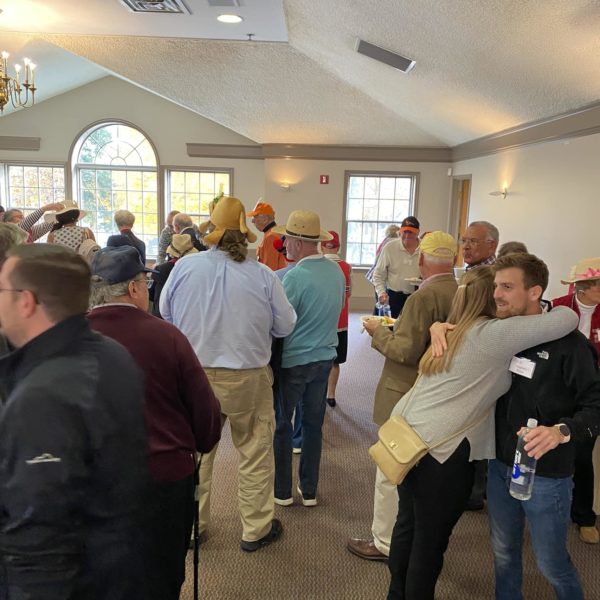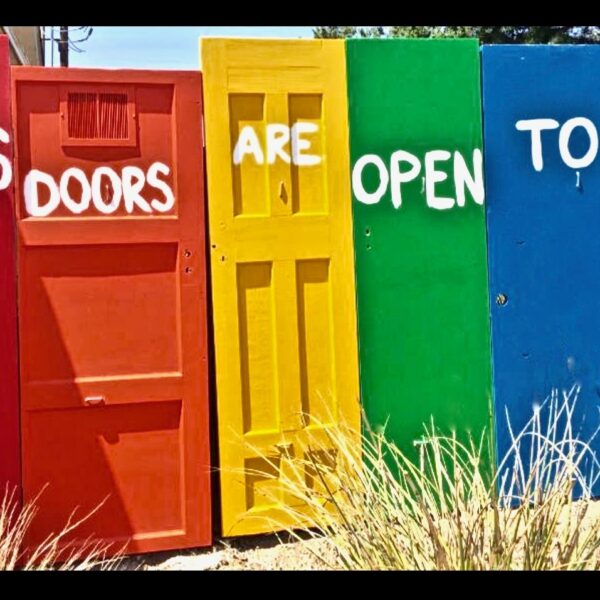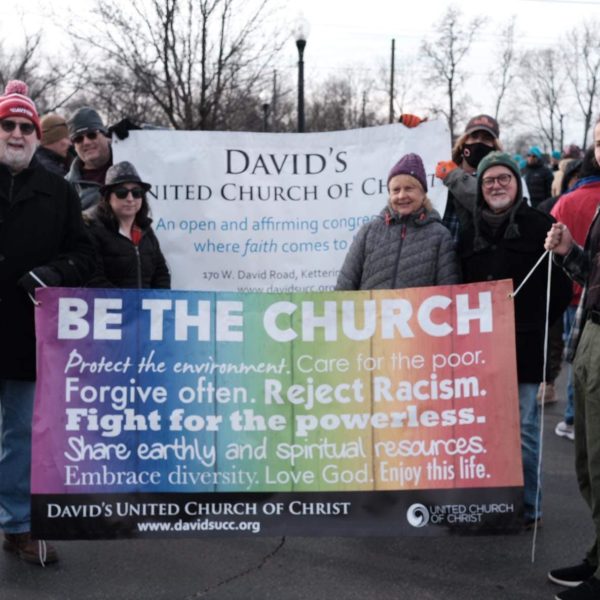937-434-2131 | Worship every Sunday @ 9:50 a.m.
937-434-2131 | Worship every Sunday @ 9:50 a.m.
Learn more about our church

As exemplified by the life and teachings of Jesus Christ,
the congregation of David’s Church welcomes and affirms the worth of all people.
At David’s Church, we strive to be an inclusive and liberating congregation
where all people can be their true selves and feel safe and free.
We celebrate God’s unconditional acceptance of every individual and
Jesus’ commandment to love one another.
Therefore, we invite, embrace, and support:
to participate fully in the life, leadership, ministry, fellowship, worship,
sacraments, responsibilities, blessings, sorrows, and joys of our church family.
Whoever you are,
know that at David’s Church, you are both worthy and welcome.
Wherever you are on life’s journey,
we invite you to walk with us as we seek to
“do justice, love kindness, and walk humbly with God.” (Micah 6:8)

David’s United Church of Christ has been a mainline Protestant church in Kettering, OH
for nearly two centuries, a progressive Christian community where Faith comes to Life. As
an Open & Affirming congregation of the UCC for over a decade, we seek to embody
God’s inclusive love and acceptance to individuals and families from around the Dayton
metropolitan area. We are known for our numerous missions, a strong confirmation
program and Sunday school, and our offer of an extravagant welcome to all who come. We
hope to continue to be a strong witness for the Kin-dom values of justice and peace-making
while serving the needs of those around us. You can read more about our very rich history by clicking the link below.

David’s United Church of Christ is a mission-minded congregation where faith comes to life as we respond to the needs around us. It is how, as Martin Luther King, Jr. taught, we put our “love into action.” At David’s, we set aside a portion of all pledges and offerings coming to the church to be shared, under the supervision of our Mission Board, with our ministry partners near and far. At David’s UCC we support mission and outreach locally, nationally, and globally.
David’s is proud to partner in Dayton with ministries that align with our four guiding principles: Vulnerable Populations; Food Insecurities; Local Impact; and Opportunity for David’s to Serve.
Our list for 2023 is below:
Warm Wishes

Beyond the financial giving, David’s members express their mission-spirit by providing meal for the first Sunday of each month at Gateway Men’s Shelter.

We also collect over 650 jars of peanut butter each month to be distributed through the Kettering Backpack Program to youngsters in the Kettering school district who receive lunch assistance, who might lack for food on the weekends. At Thanksgiving and Christmas, David’s people donate enough food and turkeys and hams to give out between 40 and 50 baskets for needy families at each of the holidays.

On Mondays, year round, our Warm Wishes crew gathers to makes fleece hats, mittens and scarves for the homeless and/or needy adults and children, producing over 36,530 items that have been dispersed through homeless shelters, food pantries and urban schools. On Tuesdays, our Quilting group gathers to sew beautiful quilts given to veterans at the VA Hospice.
It is through our participation in Our Church’s Wider Mission (OCWM) that we participate in the larger mission work of the UCC, through the Southwest Ohio Northern Kentucky Assoc. (SONKA), and the Ohio Conference and our National Church priorities including support of Church World Service and Global Ministries, with our mission partners the Christian Church (Disciples of Christ).

We are a “5 for 5” congregation of the United Church of Christ, supporting the five primary mission offerings: OCWM (basic support, which comes through the Mission Board budget) and then four special offerings of the UCC: Neighbors in Need (our support for ministry among Native Americans and peace & justice advocacy ministries), One Great Hour of Sharing (food, health, global disaster response), Strengthen the Church (support for congregational vitality in the UCC, new church starts and the “God is Still Speaking” identity campaign), and The Christmas Fund (1/4th of our Christmas Eve offering receipts go to this special offering to encourage and support retired veterans of the cross, clergy and clergy spouses in retirement).
In addition, David’s sets another quarter of our Christmas Eve receipts for Trinity Homes of Beavercreek, a UCC related retirement and nursing home, and another quarter goes to Crossroad Children’s Home, a facility to aid troubled and abandoned or abused youth in Fort Wayne, IN.
Honoring our long-time commitment, we take two special offerings each year to support our institutions of higher education. One for our UCC related Ohio colleges, Heidelberg University and Defiance College, and the other our CUE Seminaries of theological education: Chicago, United (the Twin Cities), and Eden (St. Louis, MO).
Over the years, David’s has partnered with churches throughout SONKA to support in substantial ways our mission partners in Kenya, Africa, The Rubate Teaching College and Medical Clinic. Over the years, we have sent along medical supplies, raised monies for buildings and equipment, and sent our pastors and young people as ambassadors of God’s love and care. In 2012 alone, responding to a special request for aid to provide clean water to the Clinic, David’s Church raised over $13,000 for the project.
Whether it’s in financial giving, letter writing for Bread for the World, cooking food to be served at a homeless shelter or supporting mission work in far off Africa, David’s members strive to not just ‘talk the talk,’ but to ‘walk the walk.’

“There is a way of seeing Christianity that makes persuasive and compelling sense of life in the broadest sense – a way of seeing reality and our lives in relationship to what is real; a way of seeing God, our relationship to God, and the path of transformation. The sacrifice that Christianity asks of us is not ultimately a sacrifice of intellect.” – Marcus Borg (1942-2015), The Heart of Christianity
Recently, theologian and author Marcus Borg shared with a number of ministers serving mainline congregations the importance of embracing an identity and theology that is an expression of what some call “progressive Christianity.” Here is a summation of his comments:
When we say we are theologically progressive, we are acknowledging that we approach the Scriptures specifically and theological language in general through a historical and metaphorical lens. Or, as has been said in and of the United Church of Christ slogan, “we take the Bible seriously, but not literally.”
By that phrase, we make several important distinctions. The Bible is a complex collection of ancient texts, a library of 66 different books often by different authors and from different sources. Even when translated into modern, accessible language, it carries with it an ancient context that is crucial to understanding of its meaning and message. The Bible is the product of two faith communities and, while we affirm the inspiring activity of God’s Spirit, we realize that it shares their common, often limited understanding of God and the world.

When we speak of the Bible’s historical context and meaning, we are not insisting “it happened exactly this way.” We are saying that we need to take into account that these writings are indeed ancient texts for an ancient audience, and we can only come to a reasonable understanding by taking that context into consideration.
When we speak of the Bible’s metaphorical approach, we are acknowledging the often more-than-literal meaning of the language used by the ancient faith communities that gave birth to these books. The fact that the authors used poetry, metaphor and archetypal language to give words to their experience of the living God should caution us against reading the Bible with a flat “the Bible says it; I believe it; that settles it” kind of literalist or absolutist interpretation.
We remember how the Bible has been used to persecute scientists like Copernicus and Galileo, to defend antiquated institutions like slavery, and as an excuse for all manner of –isms that empower the interest of some over the needs of others, -isms like patriarchy, racism, sexism, economic oppression and homophobia. The major message and theme of the Bible, following the teaching of Jesus, calls us to love God and to love our neighbor as ourselves. When people use particular verses of Scripture to excuse a spirit of “unlove” and exclusion, we believe they have used the Bible in a way that denies the overarching themes of love and justice.
When people use a more historically informed and metaphorical approach to reading and understanding the Bible, it can be vastly illuminating. Many of the problems associated with biblical literalism and absolutism disappear. No place is that more obvious than in the current debate fueled by literalist readings of Genesis. In the progressive approach, we find no real conflict between Christianity and science, and often see considerable complementarity at work. We are a church where you are not asked to park your brain in the narthex.
And this reading further allows us to affirm religious pluralism, and engage honestly and compassionately in interfaith dialogue. We do not feel that we have a lock on the truth, so that there is no other way to think or act or believe. We trust that the God of the universe is not only available to us and through the church, but can and does work in the world and the experience of the other enduring religions of the world. We seek to move beyond mere tolerance, to real working relationships and understanding of the religious practices of others.
Thus, we affirm and invite each person to think critically, freely and well, both about the Bible and the spiritual understandings that undergird their faith. We invite people into intentional communities of faithful inquiry and engagement. We are committed to the idea of transformation in this life, not merely as a preparation for an afterlife with God. We believe that in loving God and neighbor, we are invited to participate in a two-fold transformation: transformation of ourselves as we live into our best true selves, reconciled to one another and to God, and transformation of our world, as we seek to embody the Gospel’s teachings of a “beloved community,” where peace and justice are love’s greatest fulfillment.
“Come let us reason together,” says the Prophet. As a progressive community where Faith comes to Life, David’s UCC is a congregation where we can come with our questions and our longings for fulfillment and work out our salvation and understanding of God’s will and way together.
Sign up to receive our weekly All Church Email (ACE)!